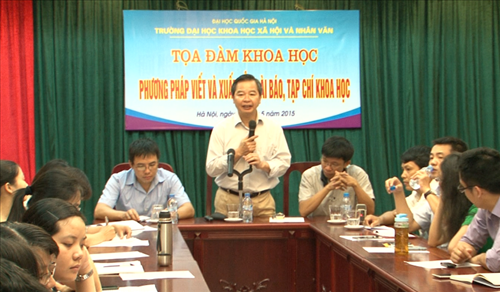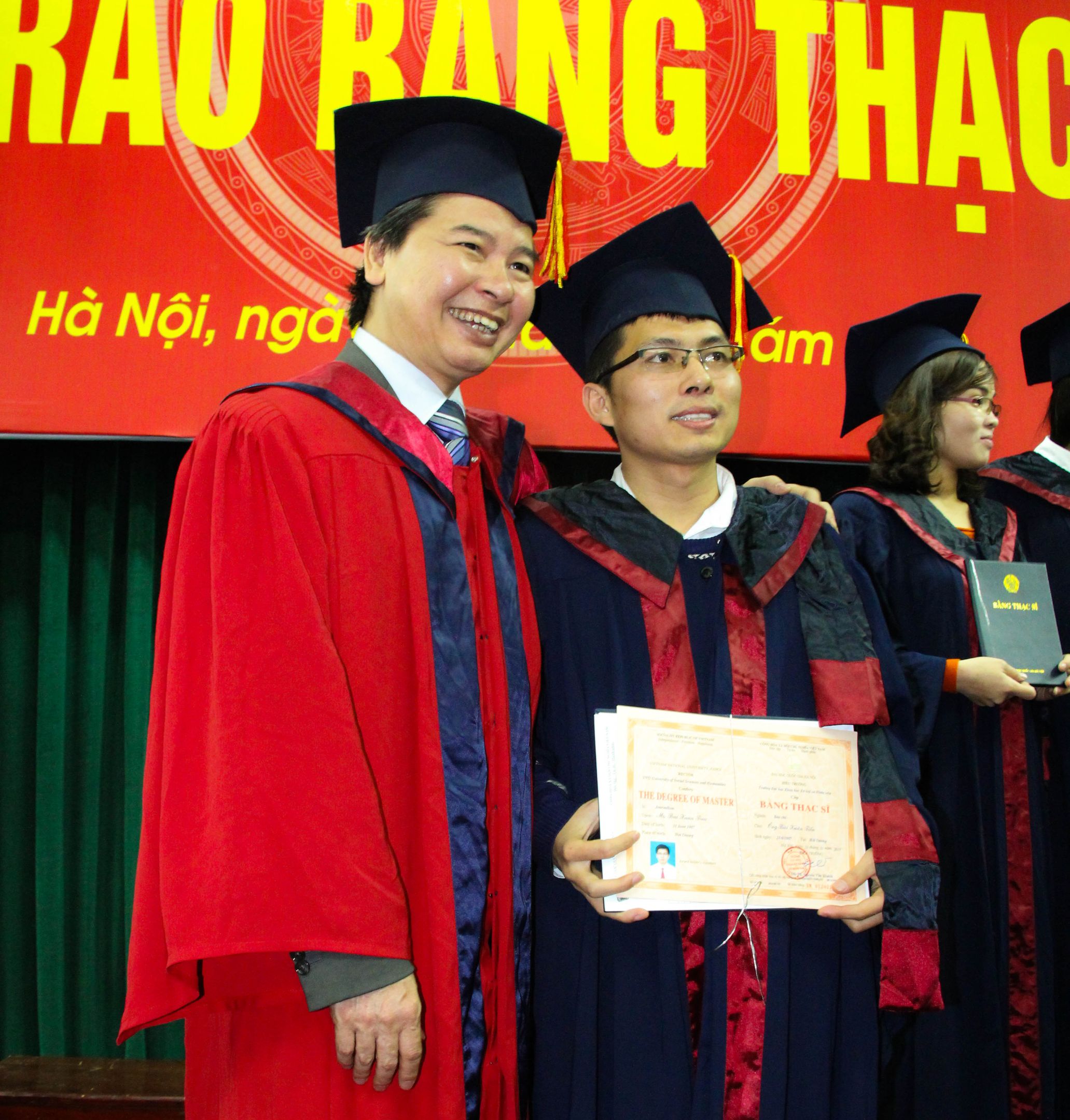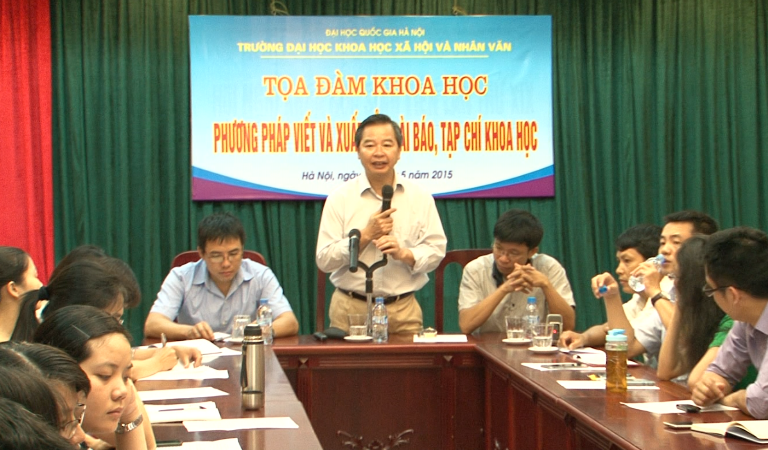
Other related information
Announcement of postgraduate admissions, second round 2015

Associate Professor Pham Quang Minh, Vice Rector of the University, took a commemorative photo with the new Master's graduates during the second Master's degree awarding ceremony at the end of 2014.
Do not be complacent about the results achieved.
Last academic year, the university enrolled 443 postgraduate students (including 7 international students) and 139 doctoral students (including 6 international doctoral students). Compared to previous years, the enrollment for master's programs decreased slightly, but the number of doctoral students remained high.
Training management and organization at the units have been improved and standardized, ensuring that training plans and schedules are implemented according to the prescribed timeframes. 876 postgraduate students and 46 doctoral candidates successfully defended their theses and dissertations and were awarded degrees.
In the 2014-2015 academic year, the University completed the adjustment of 30 research-oriented master's degree programs and 3 application-oriented programs; and added 3 new postgraduate programs: Doctor of Religious Studies, Master of Vietnamese Studies, and Master of Vietnamese Cultural History.
The university currently offers a total of 61 postgraduate programs, including 31 master's programs and 30 doctoral programs. The university is currently developing three doctoral programs: Information and Library Science, Tourism Studies, and Social Work, and four master's programs: Public Policy, Human Resource Management, Office Management, and Clinical Psychology.
The university has completed and received approval from Vietnam National University, Hanoi for its plan of majors and specialized training programs until 2020. Accordingly, by 2020, there will be 69 postgraduate training programs, including 38 master's degree programs and 31 doctoral degree programs.
Despite these achievements, the School's Board of Directors, the Head of the Postgraduate Department, and the Heads of the Faculties and Departments remain vigilant in the promotion, recruitment, and training process. Postgraduate recruitment, management, and training always face difficulties, challenges, competition, and daily changes, Associate Professor Dr. Quyet shared.

The university regularly organizes seminars to exchange ideas on methods of writing and publishing scientific research papers for young faculty members and postgraduate students.
Identify the challenges involved.
According to the 2014-2015 academic year summary report, the number of postgraduate students has decreased compared to previous years. Associate Professor Pham Van Quyet identified this as a general trend due to changes in many regulations regarding postgraduate studies at Vietnam National University, Hanoi, which is posing many challenges for the university's postgraduate admissions.
Discussing these challenges, Associate Professor Pham Van Quyet shared: The declining trend is due to adjustments in some regulations and guidelines in the admission and management of postgraduate students. Specifically, the regulation abolishing the transfer of excellent and outstanding students to pursue master's degrees, and the regulation prohibiting universities from offering postgraduate programs based on specific needs... These regulations have significantly reduced the number of students enrolling in master's programs at the University of Social Sciences and Humanities in particular, and other member universities of Vietnam National University, Hanoi in general. In addition, some regulations in the entrance exam guidelines regarding foreign languages, as in the past academic year, have also caused some reactions from candidates.
As a leading center for training and research in social sciences and humanities in the country, a unit that always pioneers in opening new majors and pilot programs, attracting a large number of applicants and students, these advantages only last for a year or two before being challenged by other training institutions with criteria and regulations that are somewhat more lenient than those of Vietnam National University, Hanoi.
“Like the Social Work major, when this major first started recruiting, the number of applicants was very large, and the competition was very high. But after only two years, this major quickly appeared at many other institutions, sometimes with more favorable regulations. This directly puts pressure on the university's recruitment of this major,” Associate Professor Pham Van Quyet shared.

PhD candidate Phan Van Kien (Faculty of Journalism and Communication) is presenting his paper at the scientific conference for young staff, postgraduate students, and PhD candidates of the University, which was held in May 2015.
Solutions
Faced with difficulties arising from changes in regulations and rules, the School's Board of Directors, along with relevant departments and functional units, have proactively devised short-term and long-term solutions aimed at maintaining and developing the School's postgraduate training programs.
Besides proposing and recommending the removal or adjustment of regulations that are not suitable for practical application in the social sciences and humanities at VNU, the Graduate Training Department of the University also sets out many major directions for its activities.
Strengthening and enhancing the role of Faculties, Departments, and assistants in training and student management activities. Decentralization of management is implemented, with the Postgraduate Training Department responsible for receiving, managing, and processing applications and focusing on the department's specialized tasks. Tasks directly related to students are transferred to the Faculties. This will make the training process, application processing, etc., more transparent and efficient.
Furthermore, students' communication with faculty assistants, department heads, and subject groups strengthens the connection in both administrative procedures and professional research. Guidance announcements are communicated quickly and promptly to students.
Furthermore, the university consistently promotes the integration of training activities with scientific research, conferences, and seminars. Each year, the university hosts dozens of domestic and international conferences, and hundreds of exchange sessions, seminars, and meetings with experts from both within and outside the country. This provides an invaluable environment for scientific exchange and learning for students studying at the university.
In addition, the university also organizes an annual conference for young faculty members, which serves as a platform for postgraduate students and young faculty members to present their research and work.
The school also employs various measures to support students facing difficulties with foreign languages. The school has a foreign language center that supports students' foreign language training activities. The center regularly opens review classes, training courses, and certification exams for B1 and B2 levels for the school's students. In addition, the school maintains regular and close cooperation with the University of Foreign Languages, Vietnam National University, Hanoi, in foreign language training, examinations, and certification.
Continue to identify, propose, and develop new training majors that meet social needs, and pilot training programs. Analyze and evaluate training programs with a high practical element to develop application-oriented training programs, suitable for targeted training and training of personnel for disadvantaged regions such as the Northwest, Central Highlands, and Southwest.
With the solutions and expectations set forth, in the coming period, the university's postgraduate training activities will continue to make solid progress, commensurate with the position and stature of a leading research university in the country.
Author:Dinh Hau
Newer news
Older news